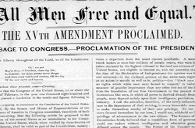Amendments to the Constitution
There are 27 amendments to the Constitution. As you know if you read the section on the Bill of Rights, the first 10 amendments are collectively known as the Bill of Rights. There are two ways to create an amendment. The first is for Congress to propose an amendment by passing a bill for the proposed amendment. This has to have a two-thirds vote by both the Senate and the House of Representatives. Then it goes to the states to be ratified. It has to be ratified by three-fourths of the states. Not all proposed amendments are ratified.
 There have been 33 proposed amendments and 27 of those have been ratified by the states. Starting in the early 20th Century a time limit was placed on ratification. The six amendments that have not been ratified include:
There have been 33 proposed amendments and 27 of those have been ratified by the states. Starting in the early 20th Century a time limit was placed on ratification. The six amendments that have not been ratified include:
- Congressional Apportionment Amendment: this one was proposed in 1789 and has still not been ratified. It would regulate the size of congressional districts.
- Titles of Nobility Amendment: this would take away the citizenship of anyone accepting a title of nobility from a foreign government. Proposed in 1810.
- Corwin Amendment: Proposed in 1861, this little gem wanted to make "domestic institutions" (read slavery) exempt from interference by the Feds.
- Child Labor Amendment: This was proposed in 1924 and would allow the Feds to regulate child labor.
- Equal Rights Amendment: Proposed in 1972 and after much heated debate and tales of the end of civilization as we know it if it passed, it failed. This would have banned discrimination by federal or state governments based on sex.
- District of Columbia Voting Rights Amendment: Proposed in 1978. This would have given the District representation in Congress.
There have been over 11,000 measures that aimed to become amendments, but they never made it through Congress. A few of the more interesting ones include:
- Christian Amendment: This has been proposed in Congress many times, but has never gotten the votes. Its goal was to recognize the Christian God in the Preamble to the Constitution.
- Anti-Miscegenation Amendment: This wanted to ban interracial marriage. At least we know that it's not just now that there are idiots in Congress.
- Renaming USA the United States of Earth: This was back in 1893 long before Star Trek.
- Anti-drunkenness amendment: Pretty self explanatory.
I've taken a summarized version of the Amendments to place here because the complete text is just a pain to format here. Eventually, I'll get it together. For the time being, if you want to see the complete version of the Amendments, click here.
By the way the summarized version below comes from Totally History.
The 27 Amendments to the Constitution
1st Amendment: Guarantees the right to the freedoms of speech, press, and religion. Protects the right to petition the government.
2nd Amendment: Guarantees the people’s right to own and bear arms for their defense.
3rd Amendment: Citizens cannot be forced to quarter soldiers during times of peace.
4th Amendment: Citizens cannot be forced to subject themselves to seizure and search without a search warrant and probable cause.
5th Amendment: Prohibits abuse of governmental authority in legal procedures. Establishes rules for indictment by eminent domain and grand jury. Guarantees the due process rights. Protects citizens from self-incrimination and double jeopardy.
6th Amendment: Guarantees fair and speedy jury trial and the rights to know the accusation, the accuser, and to find counsel and witnesses.
7th Amendment: Reserves individuals’ rights to jury trial depending on the civil case, and cases already examined by not be re-opened by another court.
8th Amendment: Forbids exorbitant bails and fines and punishment that is unusual or cruel.
9th Amendment: Reserves the rights of citizens which are not specifically mentioned by the U.S. Constitution.
10th Amendment: Reserves powers that are not given to the U.S. government under the Constitution, nor prohibited to a State of the U.S., to the people and the States.
11th Amendment: State sovereign immunity. States are protected from suits by citizens living in another state or foreigners that do not reside within the state borders. Ratified: Feb. 7, 1795
12th Amendment: Modifies and clarifies the procedure for electing vice-presidents and presidents.
13th Amendment: Except as punishment for criminal offense, forbids forced-slavery and involuntary servitude.
14th Amendment: Details Equal Protection Clause, Due Process Clause, Citizenship Clause, and clauses dealing with the Confederacy and its officials.
15th Amendment: Reserves citizens the suffrage rights regardless of their race, color, or previous slave status.
16th Amendment: Reserves the U.S. government the right to tax income.
17th Amendment: Establishes popular voting as the process under which senators are elected.
18th Amendment: Denies the sale and consumption of alcohol.
19th Amendment: Reserves women’s suffrage rights.
20th Amendment: also known as the “lame duck amendment,” establishes date of term starts for Congress (January 3) & the President (January 20).
21st Amendment: Details the repeal of the Eighteenth Amendment. State laws over alcohol are to remain.
22nd Amendment: Limit the terms that an individual can be elected as president (at most two terms). Individuals who have served over two years of someone else’s term may not be elected more than once.
23rd Amendment: Reserves the right of citizens residing in the District of Columbia to vote for their own Electors for presidential elections.
24th Amendment: citizens cannot be denied the suffrage rights for not paying a poll tax or any other taxes.
25th Amendment: establishes the procedures for a successor of a President.
26th Amendment: Reserves the right for citizens 18 and older to vote.
27th Amendment: Denies any laws that vary the salaries of Congress members until the beginning of the next terms of office for Representatives.
